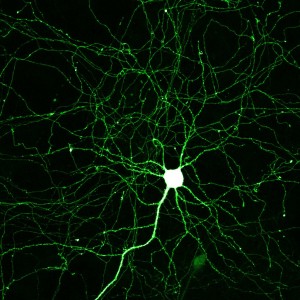I came across this NPR program today on the science of spirituality (go read all parts!), which I found fascinating, as I generally do with anything dealing with spirituality (which I consider separate from religion, but often intertwined). Let me get right into it, since there’s a lot I want to say! (Note: I’ll try to be as non-offensive as possible, but this is coming from an agnostic leaning atheist point of view. I’m quite the skeptic when it comes to religion.)

To start with, I was tickled by the quote: “neurologists suspect some of the religious giants were epileptics” because I often thought, wouldn’t it be funny (in a bit of a sad way) if religion was borne of some random guy hallucinating? Turns out that the visions that prophets had are quite likely caused by epileptic seizures or hallucinations. So was there a burning bush? Were they touched by a divine being? Perhaps it was all in their head. However, I’m not a big fan of this idea that “whether those encounters actually happened — or whether they were all in your head” are two separate possibilities. After all, everything we feel is processed by our brains or else we don’t recognize it as a feeling we had, no? As Michael Persinger put it, “all experience is generated by brain function.” So yes, it was all in their heads. But to them it was very real because it was in their heads.
Thus, to me there is no other being or “god” that is omniscient, but rather, God/the gods are within us because we thought them up. They are products of our minds, our thoughts, our feelings. And all those feelings we get of being touched by the divine? It comes from our own imaginations, taking experiences and interpreting them in our own mental framework. There’s certainly no harm in attributing it to an outside source if it makes you feel more peaceful, happy, and healthy because of it. Belief can give people hope and I think the positive emotions from faith is actually what does “magical” healing for people, though they’ll choose to attribute it to their spirituality. Do their beliefs actually create visible, measurable changes? Certainly! Any thoughts you have can do so.
“The more you focus on something — whether that’s math or auto racing or football or God — the more that becomes your reality, the more it becomes written into the neural connections of your brain.”
~ Dr. Andrew Newberg, neuroscientist at the University of Pennsylvania

photo credit: greenspine.ca
You literally are rewiring your brain with every experience you have, including the very one right now of reading thing (and for me, writing it). I don’t have anything against religion in its best form, but I don’t like when people use it as a scapegoat or security blanket and never take responsibility for their actions, good or bad. Of course, I’m also not a fan of zealots who take things too far and harm others “in the name of God.” That’s just stupid and irresponsible.
No matter what, I feel the debate will rage on because spirituality, like love and your thoughts, is something intangible. And anything that is intangible cannot ever really be proven or disproven. It just depends on if people choose to believe in them or not. When it comes down to it, how do you know you’re in love?
“Everything starts from a thought, and then the thought creates a reaction.”
~Sheri Kaplan, HIV positive but “defiantly healthy” with no medication
Sure, your brain reacts a certain way and releases certain chemicals, but in the end it’s really how you interpret what you feel and experience. And if you want to fall in love, that is how you will interpret the chemical changes you feel happening. Otherwise, you may just blame your libido or the weather. There are plenty of people who look back after a nasty breakup and claim they weren’t really in love or they’ll fall in love with someone new and say that they didn’t really know what love was until this person came along. It is what you say it is (for you, at least). The power of spirituality comes in the flexibility in how we choose to understand our thoughts and emotions, but none of that can be physically tracked.
“I think we’re wired for the supernatural,” says Scott McDermott, a Methodist pastor.
I think so too, because we need to be able to believe in things and have hope, or else life can really get us down. We need to have the capacity to believe that there is more, there is better. That’s also what drives us to pursue excellence – a hope for a better life, a better world. What it comes down to, then, is that immeasurables are too subjective to be objectively measured. And that’s the problem here – we’re trying to use science that is based in objectivity to measure spirituality, which is steeped with subjectivity. A conundrum, certainly, and probably one that will last as long as time.*

Synergy ball. photo credit: sculptors.com
For me, spirituality comes down to believing there are forces in this world that we can’t explain. For example, how do you explain consciousness? Is that not but an inexplicable result of our web of neurons interacting? I consider myself spiritual in that sense and in the pure sense of believing in a spirit within us. To me, the sum of the parts is greater than the whole. I believe in synergy. Two people working together can create things that they could not have done had they worked alone and then put it together. Likewise, those billions of neurons in our brains get together and create more than what just a random pile of neurons could. That extra bit that produces all these thoughts we have is what we consider our spirit. From my point of view though, that’s where it ends. Without the brain, there cannot be a spirit, though with a brain there may not necessarily be a spirit either. Nature’s not always fair like that. So, though the idea of an afterlife and our spirit continuing after we die is a nice one, it’s not one I buy into. However, our deaths aren’t meaningless and can infect other people’s spirits to make them feel like ours has continued on, by touching their hearts and minds and rejuvenating their own spirits.
Also, it seems that people are brought closer to spirituality when their senses shut down. From meditation and other forms of intense focus that take away from the ability to process senses to near-death experiences that rob the brain of oxygen to psychedelic episodes from hallucinagenics, people feel the closest to their spirituality when our brains are not functioning fully in reality.
“The brain function of many of these people who have undergone a near-death experience is altered,” Woerlee says. “That’s correct. It is altered. Extreme oxygen starvation does change brain function — because it causes brain damage to the larger cells in the brain.”
It’s brain chemistry, he says, not a trip to heaven.
You take a step away and see things from an angle you never did before because your brain is in an altered state. The same thing happens with age; as we grow older, our brain structure and chemistry changes, so we experience the world differently as time passes. Maturity and wisdom are actually changes in our brains that are reflected in our behavior, but really, what are they? They’re just more examples of intangibles that can never be fully and satisfactorily measured.
Another thing, spirituality is NOT religion! Religion is a form of spirituality, but I do not believe that all forms of spirituality result in a form of religion.
When it comes to the brain, Newberg says, spiritual experience is spiritual experience. “There is no Christian, there is no Jewish, there is no Muslim, it’s just all one,” Newberg says.

photo credit: pro.corbis.com
Everyone can experience a connection with the world, but in different ways, like the athlete who feels their body move in just the right way at the right time. As a swimmer, you get that when you dive and make the most wonderful entrance into the water. Everything just falls into place and it all feels right. Same thing with skating – there comes a moment when you become an extention of the board and you are in control. It’s a sort of zen, even. The most common one talked about is probably runner’s high, when you get into the groove and the world seems to fall away. Really spirituality is intense focus on what you’re doing. So much so that you don’t have room for your other senses to send their feedback to you, so all you know is the here and now and what you’re doing. I believe that’s the “oneness” people who meditate feel.
“When people lose their sense of self, feel a sense of oneness, a blurring of the boundary between self and other, we have found decreases in activity in [the pareital lobes, where sensory information is taken in].”
You get so entrenched in your own mind, your own thoughts, and not paying attention to anything your body might be telling you that you start to feel more in tune with the world, as you do in a perfect dive, a glorious ride, or a unparalleled running rhythm. It’s not just a mental thing; physically the part of your brain that processes your senses shuts down, presumably to allow the frontal lobes (where concentration happens) to work harder.
*Do note that this is different from things like wind, where you can feel it but not see it, because inner feelings are something that not everyone can agree upon. When there’s wind, the person next to me can confirm that they feel it too. You may not see it, but you feel it in a tactile way. Similarly, air is even harder to sense, but once again, everyone can agree that they sense something and we have chosen to call it air. But when you’re feeling from an emotional point of view, it’s completely internal and nobody else around you has to be sharing in such a feeling. We’re all experiencing the same world more or less, but in very different ways mostly because of our minds. Since everyone experiences their own feelings in different ways at different times, how do you come to an agreement? Simply put, you can’t.

